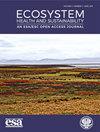Air pollution and climate change impact on forest ecosystems in Asian region – a review
IF 3.4
2区 环境科学与生态学
Q1 ECOLOGY
引用次数: 7
Abstract
ABSTRACT Forests are complex ecosystems comprising various trophic levels responsible for carrying out various biogeochemical processes and providing ecosystem services. However, forests in Asia are doubly challenged by climate change and air pollution. The rapidly changing air quality, with increasing concentration of greenhouse gases (GHGs), trace gases, volatile organic compounds (VOCs), and ozone (O3) also causes global warming leading to climate change, thus jointly creating a challenging condition for the forest ecosystem. The impact on forest ecosystems of the two anthropogenic stressors, viz., climate change and air pollution, requires global attention. These two stressors have been widely studied separately but their combined impact on the forest ecosystem has not been studied extensively, particularly in the Asian region. In this review article, we attempt to explore the importance of interlinking air pollution and climate change impact on Asian forests, by studying the decline of different forest types as a background and markers of forest ecosystem degradation. Our main aim is to understand and summarise the past and ongoing research in this area and to facilitate researchers and policymakers to upgrade their research, policies, and management strategies in the area of integration of air pollution and climate change impact on forest ecosystems in the Asian region.空气污染和气候变化对亚洲地区森林生态系统的影响——综述
摘要森林是一种复杂的生态系统,由不同的营养级组成,负责进行各种生物地球化学过程并提供生态系统服务。然而,亚洲的森林受到气候变化和空气污染的双重挑战。随着温室气体(GHGs)、微量气体、挥发性有机化合物(VOCs)和臭氧(O3)浓度的增加,空气质量的快速变化也导致了全球变暖,从而导致了气候变化,从而共同为森林生态系统创造了一个具有挑战性的条件。气候变化和空气污染这两个人为压力源对森林生态系统的影响需要全球关注。这两种压力源已被分别广泛研究,但它们对森林生态系统的综合影响尚未得到广泛研究,尤其是在亚洲地区。在这篇综述文章中,我们试图通过研究不同森林类型的减少作为森林生态系统退化的背景和标志,来探讨空气污染和气候变化对亚洲森林影响之间相互联系的重要性。我们的主要目标是了解和总结该领域过去和正在进行的研究,并促进研究人员和政策制定者升级他们在整合空气污染和气候变化对亚洲地区森林生态系统影响方面的研究、政策和管理战略。
本文章由计算机程序翻译,如有差异,请以英文原文为准。
求助全文
约1分钟内获得全文
求助全文
来源期刊

Ecosystem Health and Sustainability
Environmental Science-Management, Monitoring, Policy and Law
CiteScore
7.10
自引率
2.00%
发文量
40
审稿时长
22 weeks
期刊介绍:
Ecosystem Health and Sustainability publishes articles on advances in ecology and sustainability science, how global environmental change affects ecosystem health, how changes in human activities affect ecosystem conditions, and system-based approaches for applying ecological science in decision-making to promote sustainable development. Papers focus on applying ecological theory, principles, and concepts to support sustainable development, especially in regions undergoing rapid environmental change. Papers on multi-scale, integrative, and interdisciplinary studies, and on international collaborations between scientists from industrialized and industrializing countries are especially welcome.
Suitable topics for EHS include:
• Global, regional and local studies of international significance
• Impact of global or regional environmental change on natural ecosystems
• Interdisciplinary research involving integration of natural, social, and behavioral sciences
• Science and policy that promote the use of ecological sciences in decision making
• Novel or multidisciplinary approaches for solving complex ecological problems
• Multi-scale and long-term observations of ecosystem evolution
• Development of novel systems approaches or modeling and simulation techniques
• Rapid responses to emerging ecological issues.
 求助内容:
求助内容: 应助结果提醒方式:
应助结果提醒方式:


